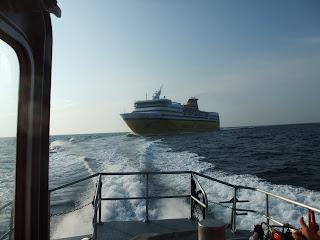
Saturday morning was spent in the port of Antibes, with everybody, including rank beginners like myself, learning to dock and cast off the lifeboat. Quite farcical to begin with, as we presented the craft at very odd angles to the quay. But gradually we got better at it, and my last attempt didn't scare anybody, even though the throttles are super-sensitive, and could almost drive the bows through a concrete sea-wall. After the morning's exercise, we washed down the boat, checked out the engine-room, had a small beer and headed home.
Just as lunch was over, however, the beeper beeped and I ran to the station. I was called on my mobile, too, as I was sprinting, so I knew it was serious. A sailing boat was sinking some 30km off Antibes, and our lifeboat was the only one nearby, equipped with salvage pumps, allowed to go out that far. Things weren't helped by the fact that the crew had now dispersed. One poor chap even got arrested by the cops as he tried to get to the station as quickly as he could. His absence was keenly felt, as we eventually set out to sea with just three of us plus the cox, and one chap has a damaged shoulder. It really was the odds and sods brigade, which wasn't ideal if we had to pump out a boat and take it in tow.
On the way out, the chop was just enough to make things tickly when getting out the salvage equipment, which is very heavy and slides around the deck. It was also bumpy enough to spill the lifeboat secretary's drink (the first liquid he'd had all day, as he had been working) all over his dress uniform. He hadn't had time to change from the togs he had been wearing for an official function.
We raced there, with the windscreen wipers working overtime against the spray and occasional packets of water. Meanwhile, we were trying to figure out all the possible ways of rigging a venturi pump, in case the amount of water in the sailing boat was really serious. Lots of combinations possible, only one of them sucks water, the others pump water in: not what we wanted.
A couple of kilometers from the position we had been given, we came onto a collision course with one of the massive fast ferries to Corsica. We had no time to lose, and needed to cross their bows to reach our casualty. We hailed them on the VHF in French - no response. I tried them in English - no response, and we were getting perilously close. Finally we tried Italian, and they answered. Phew, we were sweating by then. They slowed down by about one knot, just sufficient for us to scrape across in front of their massive bulb bow. Check out our wake vis a vis their bow in the photo...
Then we saw the sailing boat, by now accompanied by a fishing boat. It was listing badly, and when we got to about 300 metres, after 30km of flat out, rivet and bone shaking race against time, the bow of the sailing boat went down, the stern rose in the air, and the Titanic scene played itself out in tragic miniature. Bubbles, sad personal effects, food and clothing bobbed to the surface over the next few minutes. We just hoped there was nobody aboard when it dived to the bottom. We were all in tears, it is like watching the end of a living being. Horrible.
We hailed the fishing boat, and took the crew of the sailing boat on board. They had taken to a small inflatable, which would have been almost impossible to find had they been on their own. They were cold and shocked. A whisky was served, the bottle protected from smashing with the lifeboat's motion by being placed in a lifeboatman's thermal welly-boot. It looked like pouring pee from a welly! Still, it bucked up our casualties, who were dead tired.
On the way back, yours truly, fresh from a full 15 minutes' driving instruction in the morning, and that in the sheltered waters of Antibes port, now took the helm, checked the charts, compass and radar, and brought us safely back through the shipping lanes and right to the entrance to the port. Nearly three hours at the wheel and it felt like it.
Once back in port and tied up, it was the usual rigmarole of cleaning, engine room routines, reports on oil, water and fuel levels, all in an engine room which had had plenty of time to heat up. We were down to our last 500 litres per engine, not a good margin for safety.
Aucun commentaire:
Enregistrer un commentaire